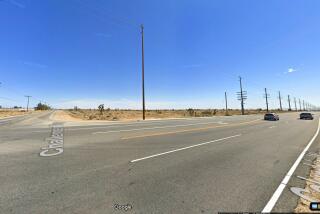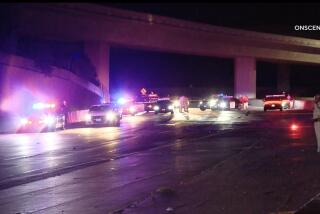PRINTER: THE LINE BELOW GOES UNDER THE LOGO. : On the Road With Highway Queen : After Nine Years, CHP Sergeant Still Finds Pride in the Southland’s Asphalt Maze
- Share via
Karen Douglas didn’t think she would make it through “the five worst months of my life.”
“Oh, it was a killer,” recalled the 37-year-old mother of two sons, guiding her black-and-white Dodge around slower traffic on the San Bernardino Freeway. “I thought I was going to die. There I was, competing with guys 21 or 22 years old, fresh out of the service. I couldn’t run as fast as the others. The instructors screamed at me.
“Back then they tried to put as much stress on you as they could to teach you to control your emotions.”
In the next lane a fat, bearded man steers his decrepit blue Pontiac toward a freeway exit, ostentatiously signaling the turn with his left arm while peering at Douglas out of the corner of his eye. “He sees me,” Douglas remarks, smiling. “His turn signals don’t work. I wonder how many times he really uses his arm.”
Life at the Academy
One of only three female sergeants among the 4,417 men and 309 women in the California Highway Patrol, Douglas glanced at the Pontiac leaving the freeway, and returned to the “five worst months” of her life: 21 weeks spent nine years ago at the CHP Academy in Sacramento.
For the 5-foot-6 1/2-inch, 130-pound, thrice-divorced field sergeant the hardest part of the academy involved her children: “They (the instructors) could call me names and tell me I was going to die because I was not strong enough. But I felt guilty about leaving my kids for the first time, and when they told me I was a lousy mother and I should be home with my kids, it was devastating.”
By now, Douglas is cruising the Pomona Freeway. She pulls up behind a sedan parked on the shoulder. The driver explains that a tank truck hit his car. “Probably the wheel hub of the truck did it ... sometimes they take the whole side of the car off,” Douglas observes, calling on her radio for a patrol officer. In minutes, two CHP motorcycle officers ride down the freeway shoulder to take a report.
Back in her vehicle, Douglas reminisced about when she first considered becoming a cop. It was 19 years ago at Earl Warren High School in Downey, where she lived in a beige, three-bedroom house on a quiet residential with her mother, who was a seamstress, and her father, who owned a machine shop.
“Up till I was 15 my ambition was to be 16,” Douglas said, with a mischievous smile typical of her on-again-off-again sense of humor that crops up often and unexpectedly. She turned serious again, and said, “By the time I was 16, I wanted to be a deputy sheriff.”
“I saw it as a rewarding, exciting job where people would look up to me.”
The first thing Douglas did after graduating from high school in 1966 was to get a job laying out art work at a container company. Next she got married. “I was 18 and thought I could do anything I wanted.”
Douglas’ son, Mark, arrived on May 24, 1967. Four months later the new mother went to work for General Telephone Co., hooking up wires in its Downey office.
After three years of that work, Douglas signed up to take the Los Angeles County Sheriff’s Department entrance exam. The same week she was due to take the test, she discovered she was pregnant again.
“I’d been trying to get pregnant anyway. I wasn’t real disappointed,” she said.
Not Much of a Challenge
On Oct. 9, 1970, her second son, David, was born. Douglas spent three years at home, raising her boys. Then she got a job as a restaurant hostess/waitress. She didn’t find it much of a challenge, and within a year she was a part-time student, taking law enforcement courses at Cerritos College. She got A’s, “especially because I took only two courses a semester.”
Until nine years ago, Douglas’ resume boasted a hopscotch work history. In addition to the jobs already noted, she also had stints as a metal lathe operator, department store clerk and cocktail waitress.
In the summer of 1977, she signed up to take entrance exams for both the Sheriff’s and Highway Patrol’s academies.
The Highway Patrol’s academy started a month before the Sheriff’s, and Douglas “always wanted to work traffic. I wanted to be out there in a patrol car and the Sheriff’s told me I’d spend the first five years working in the jail.” So she chose the CHP:
“July 11, 1977. It’s a date nobody ever forgets, the day you go into the academy. It’s like your birthday, or the day an alcoholic takes his last drink.”
Douglas struggled through the academy, one of six women to start her class of 61 cadets, one of four women among 50 graduates.
‘Loyal and Competent’
She was assigned to the CHP office in Santa Fe Springs, commanded by Capt. Worley Jones, since retired, whom Douglas describes as “a good ol’ Texas boy.”
“As a field officer she functioned very well,” Jones recalled recently. “I had full and complete confidence in her. She’s good people.
“She’s got a quick mind. I found her to be loyal and competent. I was so impressed with her that I made her the first female public affairs officer in the state.”
The Highway Patrol takes pride in its public image. As public affairs officer, Douglas’ responsibility was to keep that image honed sharp on the public conscience. It was an important job, one she executed for 2 1/2 years.
“I didn’t think I’d find anybody as good as she was to fill her shoes,” Jones said.
Douglas turns off the Foothill Freeway and heads for Gene’s Grinders, a favorite food stand that carries a prune-flavored soft drink she likes called Mr. Pibb. Behind her, a blue Ford sedan swings left across two pairs of double yellow lines on the surface street. “Oh, that jerk,” Douglas mutters, but she lets him go. The sergeant often talks to herself that way while on patrol. A couple of teen-agers riding double and dangerously on a bicycle inspire, “Get off that bike, you crazy kids,” and a car pulling out from behind and passing her rates a Puckish grin and “Oh, am I in your way?”
As a sergeant, Douglas earns $41,040 annually for supervising between 10 and 20 officers, depending on the day’s duty roster. She arranges work schedules, takes care of endless paper-work and cruises the freeways more to provide support for her officers than to make arrests.
She concedes that her sex made it tougher for her in the CHP, but she has “arrived,” and her pride in having made it is undisguised.
“It took me a long time to get accepted,” she said. “But I showed the guys that since my paycheck’s the same size as theirs, I’m willing to do just as much work.”
One of the guys who accepts her is Pat Lord, a 17-year CHP veteran, and Douglas’ training officer shortly after she graduated from the academy.
“He was so mean to me. He screamed at me,” Douglas recalled, grimacing at the memory. The expression faded fast, to be replaced by one of enthusiasm. “He was great. He was doing it to teach me. I never made the same mistake twice with him. Never.”
Lord remembers well his month of training Douglas. “She had good common sense, a good feeling about the street and how to deal with people,” he said. “She’s in the top 20% of the 30 or 35 officers I’ve trained. She never turned away from any situation.”
He said Douglas was very good, but not perfect: “A couple of times we made arrests and she was a little overzealous, willing to step into things without knowing everything that was there.”
Driver and Passengers
For example, Lord said, sometimes “she was concentrating too much on the bad guy and not paying enough attention to the passengers in the car, who can also be dangerous.”
As for screaming at Douglas, Lord allowed that “that’s my normal way of working with trainees. You just have them for 20 days, and that isn’t enough time to be diplomatic. You just have to shove things down their throats.”
In her nine years on the Highway Patrol, Douglas has drawn her stainless-steel Smith & Wesson .38-caliber revolver only twice. The first time was when she stopped a car for a burned-out headlight. As the driver opened his glove compartment to get his registration she spotted a handgun there. She covered the driver and passenger with her service revolver while her partner got the gun. It turned out the weapon belonged to the passenger, who was wanted in Louisiana for dealing drugs.
The second time Douglas’ revolver left its holster was to cover “two bearded, grubby-looking guys” driving a car that showed up as stolen on the Department of Motor Vehicles’ computer. “I had them throw their keys onto the freeway where they got run over and all bent up. They didn’t identify themselves till we had them laying in the ice plant. Then they said they were LAPD undercover cops who had recovered the stolen car,” Douglas said, laughing. “They yelled at me and called me a stupid woman and all that. But I just told them they should have put the car in the computer. That’s the first thing you’re supposed to do when you recover a stolen car.”
Karen Douglas is dedicated to her work. But she doesn’t spend all her time at it. When she’s not on the job, she’s usually in her big, new, four-bedroom house where she lives with her younger son, a student. Her older boy works as a warehouseman in Downey.
Douglas’ home is particularly tidy, uncluttered despite collections of goodies like seashells, baskets and pig likenesses. “I collect everything,” Douglas said, walking past three frames of Olympic pins and a huge, globular bowl of matchbooks in her family room.
A white, miniature poodle named Lady followed Douglas around the house. A giant black Rottweiler who answers to Bill stood guard outside the back door.
On duty, Douglas wears her blond hair severely, in a bun on top of her head. At home, her hair rolls down to her shoulders, and curls sit lightly at the sides of her neck. She dresses in bright clothes, and looks singularly unlike a police officer.
But a police officer she is, first and foremost. No matter whether she’s in her kitchen or in her patrol car, in her living room or at her CHP desk, Douglas knows what she wants to be. Ask her, and she’ll give you a pixie grin and respond: “I want to be Queen of the Highway Patrol.”
More to Read
Sign up for Essential California
The most important California stories and recommendations in your inbox every morning.
You may occasionally receive promotional content from the Los Angeles Times.










